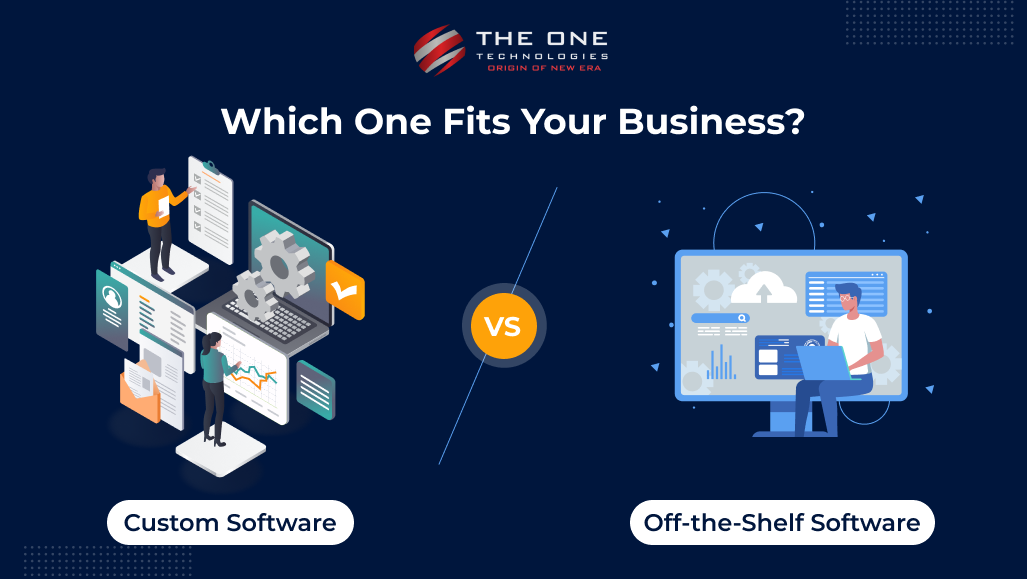Custom Software vs Off-the-Shelf Software: Which One Fits Your Business?

Selecting business software in 2025 is like deciding whether to build a house from the ground up or to rent an apartment that someone else has already decorated. Both work, but one feels tailor-made for your life while the other. Sometimes you just roll with the quirky closet.
Okay, so should you get custom software developmet services made just for you, or go with something you can buy right off the shelf? Well, it all boils down to how much money you have, how different your work process is, and where you see your company going in the near future. Here’s the real breakdown, minus the tech jargon.
Custom vs Off-the-Shelf: What’s the Actual Difference?
Custom Software = Your business gets its own digital tailor. Every feature, button, and integration is built specifically for how you work. Imagine software that doesn’t just "handle" invoices but automates them exactly how your accounting team prefers.
Off-the-Shelf Software = The IKEA approach. Tools like QuickBooks or Salesforce are designed to work "well enough" for most businesses. You might tweak a few settings, but you’re stuck with the core design.
Now, let’s dig into what really matters.
1. Cost: Pay Now or Pay Later?
Custom Software
Okay, so yeah, the initial price is a bit of a highlight. You gotta pay the people making it – the coders, the designers, the testers – to basically create something out of thin air. But listen, once it's done, it's all yours. No sneaky subscription hikes or "premium feature" paywalls.
Pro Tip: If your business has predictable long-term needs (like a law firm with strict document workflows), custom software pays off. You’re basically future-proofing.
Off-the-Shelf Software
Cheaper to start? Absolutely. But those "$15/month per user" plans add up fast. Plus, you might end up paying for features you never use or worse, buying extra plugins to make the software do what you need.
Real Talk: Once, a mid-sized marketing agency spent $8,000/year on a project management tool… only to realize half their team barely used it.
2. Customization: Your Way or the Highway?
Custom Software
This is where it shines. Need software that talks directly to your legacy inventory system? Or a CRM that tracks customer interactions exactly how your sales team works? Custom builds don’t just accommodate quirks, they’re built around them.
Example: A brewery built custom software to track batches from brewing to delivery, including weird variables like "humidity tolerance." Try finding that in an off-the-shelf system.
Off-the-Shelf Software
You get what you get. Sure, you can change the logo color or add a few custom fields, but major workflow changes? Rarely possible.
Use Case: If you’re a freelance graphic designer, tools like Canva or Adobe probably cover 90% of your needs without customization.
3. Speed: Need It Yesterday?
Custom Software
Gonna be real, this takes time. Even with agile development, you’re looking at weeks (or months) before everything’s polished. But modern devs often release usable chunks early, so you’re not waiting forever.
Off-the-Shelf Software
Download today, use tomorrow. Perfect for emergencies, like when your old system crashes and you need a replacement now.
4. Scalability: Growing Pains or Smooth Sailing?
Custom Software
Grows with you, no sweat. Adding users? Integrating with new tools? Just tweak the code. No fighting with arbitrary "user limits" or paying for bloated enterprise plans.
Off-the-Shelf Software
Hit a user cap? Congrats, you’ve just unlocked the "Contact Sales for Pricing" tier. Scaling often means migrating to a whole new system, a headache nobody wants.
5. Security & Compliance: Who’s Responsible?
Custom Software
You control the security measures. Need HIPAA compliance or military-grade encryption? Build it in from day one.
Off-the-Shelf Software
Vendors handle security updates, which is great… unless they’re slow to patch vulnerabilities (*cough* 2020 Zoom exploits cough).
The Bottom Line: Which Should You Choose?
Here’s a quick gut-check:
Go Custom If:
- Your workflows are weirdly specific (like manufacturing with niche quality checks)
- You hate recurring fees and want full ownership
- Long-term efficiency outweighs short-term cost
Go Off-the-Shelf If:
- You need something now and can live with minor compromises
- Your processes are pretty standard (accounting, basic CRM, etc.)
- Your team isn’t tech-savvy enough to handle custom setups
Still stuck? Start by listing your "must-have" features versus "nice-to-haves." Sometimes, the right choice becomes painfully obvious.
The Conclusion
Deciding between custom and off-the-shelf software in 2025 isn't about finding a universally better option. It's about finding the right software development company for your business.
Off-the-shelf software is ready to go and often cheaper at first. But it can box you in because you can't change much, and growing with it can be tricky and costly in the long run. Custom software takes more time and money to start, but it lets you build exactly what you need. You own it completely, and it can easily grow as your business does.
The best choice depends on your budget, how unique your business is, your plans for the future, and if you're willing to invest in something that helps you grow, not just get by. Think about what you really need versus what would be nice to have. Like your business, your software should be able to adapt to stay relevant.









